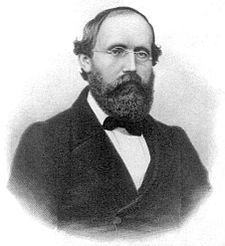Bernhard Riemann
| Bernhard Riemann | |
|---|---|

Bernhard Riemann in 1863.
|
|
| Born | Georg Friedrich Bernhard Riemann 17 September 1826 Breselenz, Kingdom of Hanover (modern-day Germany) |
| Died | 20 July 1866 (aged 39) Selasca, Kingdom of Italy |
| Residence | Kingdom of Hanover |
| Nationality | German |
| Fields | |
| Institutions | University of Göttingen |
| Alma mater | |
| Thesis | Grundlagen für eine allgemeine Theorie der Funktionen einer veränderlichen complexen Größe (1851) |
| Doctoral advisor | Carl Friedrich Gauss |
| Other academic advisors | |
| Notable students | Gustav Roch |
| Known for | See list |
| Influences | J. P. G. L. Dirichlet |
| Signature | |
Georg Friedrich Bernhard Riemann (German: [ˈʀiːman]; 17 September 1826 – 20 July 1866) was a German mathematician who made contributions to analysis, number theory, and differential geometry. In the field of real analysis, he is mostly known for the first rigorous formulation of the integral, the Riemann integral, and his work on Fourier series. His contributions to complex analysis include most notably the introduction of Riemann surfaces, breaking new ground in a natural, geometric treatment of complex analysis. His famous 1859 paper on the prime-counting function, containing the original statement of the Riemann hypothesis, is regarded, although it is his only paper in the field, as one of the most influential papers in analytic number theory. Through his pioneering contributions to differential geometry, Bernhard Riemann laid the foundations of the mathematics of general relativity.
Riemann was born on September 17, 1826 in Breselenz, a village near Dannenberg in the Kingdom of Hanover in what is the Federal Republic of Germany today. His father, Friedrich Bernhard Riemann, was a poor Lutheran pastor in Breselenz who fought in the Napoleonic Wars. His mother, Charlotte Ebell, died before her children had reached adulthood. Riemann was the second of six children, shy and suffering from numerous nervous breakdowns. Riemann exhibited exceptional mathematical skills, such as calculation abilities, from an early age but suffered from timidity and a fear of speaking in public.
...
Wikipedia
